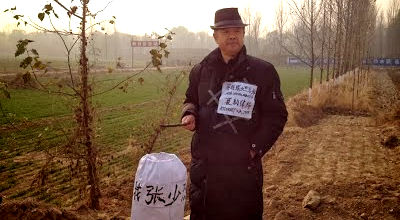Why Is China Still Arresting Christians by the Dozens?
On Saturday, Nov. 16, approximately a dozen Chinese police officers walked into the Nanle County Christian Church in Henan province, a government-sanctioned Three-Self Patriotic church, and “tied up” the church’s pastor, Zhang Shaojie. Authorities then spirited him away to a secret location. Three weeks later, no one is quite sure where exactly pastor Shaojie is or if he’s even still alive.
The pastor’s arrest sparked an immediate outcry from family and church members, who proceeded to gather in front of the local police station in protest. According to ChinaAid, a religious rights group based in Texas, authorities reportedly threatened the group of protestors, striking some members and “causing Pastor Zhang’s [elderly] parents [to be hospitalized] for high blood pressure.” Two of the pastor’s sisters, present at the protest, were also taken into custody.
The next day, the situation went from bad to worse for the Nanle County Christian Church. Police stationed themselves outside of the church building and arrested anyone who tried to go inside. All told, the number of arrested church members, including pastor Shaojie, is currently believed to be 23.
Shaojie’s arrest came a mere day after the country’s Communist Party’s Central Committee promised an end to the more than half-century-old program of “re-education through labor.” The program, which allows any citizen to be sentenced to up to four years of imprisonment by police without trial, has been used for decades to lock up everyone from drug addicts to political “dissidents.” Among those imprisoned “dissidents” have been countless thousands of Chinese Christians who choose to worship “illegally” in unregistered, and therefore unsanctioned, house churches.
Yet Shaojie’s arrest is all the more alarming precisely because he is not a pastor of an unregistered house church. Shaojie’s church is an official Three-Self Patriotic Movement church, registered with the government and therefore, at least theoretically, operating legally. In fact, Shaojie is himself the chairman of the local Three-Self Committee. His arrest, and the arrest of so many of his church members, may be new cause for concern for the millions of Chinese Christians who believe they are worshipping safely in a government-sanctioned Three-Self church.
Worse still are the threats that have fallen on some of Shaojie’s family members. On Nov. 19, ChinaAid reported that Shaojie’s daughter, Zhang Huixin, was forced to flee into hiding with her husband and 10-month-old daughter. Huixin had received more than 10 threats in two days, including one in which a caller threatened to “wipe out her entire family” if she didn’t stop relaying information on the arrest of her father to the outside world.
While international observers tend to agree that overall conditions for religious minorities are gradually improving across China, Shaojie’s arrest is a serious indicator that major obstacles remain. This is even acknowledged by the United States in the most recent report by the U.S. Commission on International Religious Freedom, a government watchdog.
The 2013 report states, “The Chinese government continues to perpetrate particularly severe violations of the freedom of thought, conscience, and religion or belief. Religious groups and individuals considered to threaten national security or social harmony … are illegal and face severe restrictions, harassment, detention, imprisonment and other abuses.”
Perhaps the only real ray of hope in what appears to be an otherwise dismal situation for Shaojie is the small amount of international attention his case is receiving. Human rights lawyers from across China have rushed to take on his case, though so far they have met only with obstruction by the local government and have been refused access to most of the arrested church members.
Still, as long as the glare of the international spotlight continues to shine on the case of Shaojie and Nanle County Christian Church, there is hope that the authorities in Henan province, as well as the officials at the highest levels of the Chinese Communist Party, will be held accountable for their actions.
This article originally appeared on persecution.org.















































